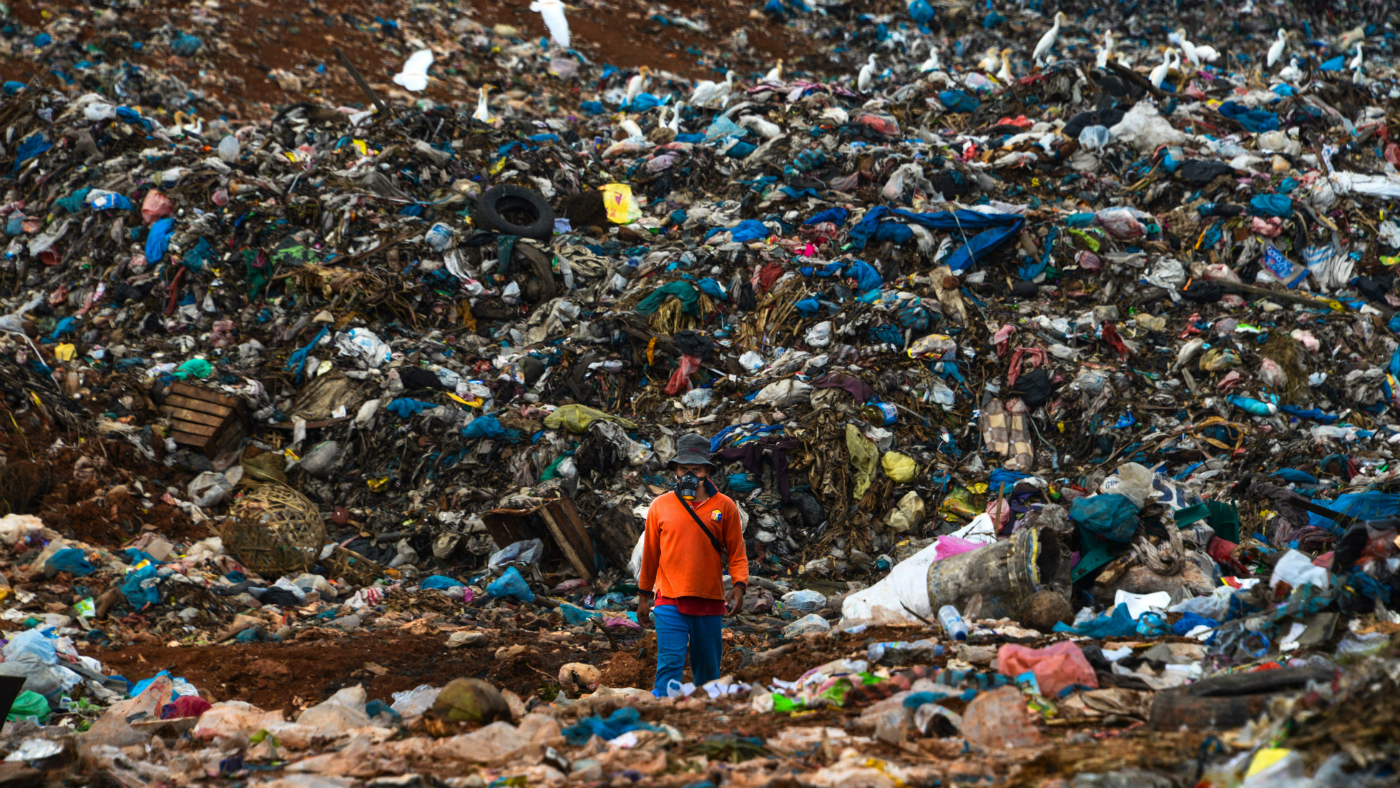‘City of smoke’: how the West is poisoning Indonesia’s food chain
The Southeast Asian nation is burning mountains of imported plastic waste

A free daily email with the biggest news stories of the day – and the best features from TheWeek.com
You are now subscribed
Your newsletter sign-up was successful
Indonesia’s finely balanced food chain is being poisoned by the burning of plastic waste shipped from Western countries.
According to a report released this week by IPEN (the International Pollutants Elimination Network), tests on chicken eggs in an East Java village called Tropodo found levels of dioxins that were 70 times those allowed under European safety standards.
The toxic chemicals are “known to cause cancer, birth defects and Parkinson’s disease”, says The New York Times.
The Week
Escape your echo chamber. Get the facts behind the news, plus analysis from multiple perspectives.

Sign up for The Week's Free Newsletters
From our morning news briefing to a weekly Good News Newsletter, get the best of The Week delivered directly to your inbox.
From our morning news briefing to a weekly Good News Newsletter, get the best of The Week delivered directly to your inbox.
A local resident told the BBC that Tropodo was known locally as the “city of smoke”.
According to Indonesia’s statistics agency, imports of potentially deadly plastic waste rose by 141% to 283,000 tonnes in 2018. The waste is “primarily from countries such as Australia, Canada, Ireland, Italy, New Zealand, the UK and the US”, says the BBC.
The dramatic increase came after China banned the import of waste to its mainland, prompting Western nations to look for dumping grounds elsewhere.
Although some local companies profit by accepting the shipments, much of the plastic is unwanted, low-grade material. Much of it is burned as fuel for tofu-producing kitchens or to simply get rid of it - but “the smoke and ash produced by the burning plastic has far-reaching and toxic consequences”, says the New York Times.
A free daily email with the biggest news stories of the day – and the best features from TheWeek.com
–––––––––––––––––––––––––––––––For a round-up of the most important stories from around the world - and a concise, refreshing and balanced take on the week’s news agenda - try The Week magazine. Get your first six issues for £6–––––––––––––––––––––––––––––––
The paper adds that things may soon change as legislation halting the overwhelming influx of plastic is slowly being implemented.
Reuters reports that earlier this year, Indonesian customs officers began uncovering imports of scrap mixed with other waste, such as rubber and nappies, and have begun shipping them back to their home countries.
But the problem is not yet fixed. Environmental news site Mongabay reports that between July and August 2019, Indonesia denied entry for 58 containers exported from the US, with Indonesian authorities claiming they repatriated the containers full of waste to the country of origin.
“But only 12 of those containers eventually returned to the US,” the site says. “The rest appeared to have been sent to India, Thailand, Vietnam, Mexico, the Netherlands, Canada and South Korea between August and October.”
-
 How to Get to Heaven from Belfast: a ‘highly entertaining ride’
How to Get to Heaven from Belfast: a ‘highly entertaining ride’The Week Recommends Mystery-comedy from the creator of Derry Girls should be ‘your new binge-watch’
-
 The 8 best TV shows of the 1960s
The 8 best TV shows of the 1960sThe standout shows of this decade take viewers from outer space to the Wild West
-
 Microdramas are booming
Microdramas are boomingUnder the radar Scroll to watch a whole movie
-
 Epstein files topple law CEO, roil UK government
Epstein files topple law CEO, roil UK governmentSpeed Read Peter Mandelson, Britain’s former ambassador to the US, is caught up in the scandal
-
 Iran and US prepare to meet after skirmishes
Iran and US prepare to meet after skirmishesSpeed Read The incident comes amid heightened tensions in the Middle East
-
 Israel retrieves final hostage’s body from Gaza
Israel retrieves final hostage’s body from GazaSpeed Read The 24-year-old police officer was killed during the initial Hamas attack
-
 China’s Xi targets top general in growing purge
China’s Xi targets top general in growing purgeSpeed Read Zhang Youxia is being investigated over ‘grave violations’ of the law
-
 Panama and Canada are negotiating over a crucial copper mine
Panama and Canada are negotiating over a crucial copper mineIn the Spotlight Panama is set to make a final decision on the mine this summer
-
 Why Greenland’s natural resources are nearly impossible to mine
Why Greenland’s natural resources are nearly impossible to mineThe Explainer The country’s natural landscape makes the task extremely difficult
-
 Iran cuts internet as protests escalate
Iran cuts internet as protests escalateSpeed Reada Government buildings across the country have been set on fire
-
 US nabs ‘shadow’ tanker claimed by Russia
US nabs ‘shadow’ tanker claimed by RussiaSpeed Read The ship was one of two vessels seized by the US military